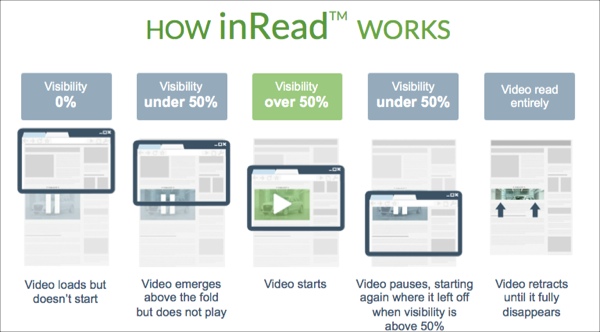-
Teads.tv Cleverly Creates Premium Video Ad Inventory, But Without the Premium Video Content
Teads.tv, a French ad tech provider, has an interesting solution to the scarcity of premium video ad inventory: enable premium text-based web pages to carry video ads as well. In-page video ads and rich media units have been around for a while for a similar purpose, but Teads.tv's "InRead" unit is a different approach that I believe nicely balances advertiser concerns about viewability and performance with publisher/user concerns about experience.
As shown in the graphic below, with the InRead unit, the video ad only begins to emerge as the reader scrolls down the page (which means InRead unlocks value below the fold). When more than 50% of the InRead ad is visible, it begins playing. If the reader keeps scrolling and less than 50% of it is visible, then the video will pause. If the viewer scrolls back up it plays from the point it left off. When the ad is finished it disappears. Audio only plays when the ad is moused over. The advertiser only pays on completed views. Teads.tv created a mockup of a VideoNuze page demo'ing InRead, which illustrates all of this.

Fabien Livet, head of operations for Teads.tv and John Osborn, director of business development for North America, recently shared some compelling sample publisher data: looking at about 80K pages, 47K were non-supported for InRead (e.g. pages too short, contained Flash, were slide-shows, etc.). On the 32K pages loaded with an InRead ad, they were played 27K times, with 14.5K, or nearly 54% of them to completion. This is the basis on which the advertiser would pay. Rates vary, but Fabien and John said current publishers are seeing $.10-$.15 per completed view.
Recognizing its benefits, InRead has been quickly deployed by many European publishers such as FT, Le Monde, Les Echos, Vogue, Reuters UK plus others (here's an example of a recent IBM campaign running on FT.com). InRead is now being introduced in the U.S. as well; no customers have been disclosed yet, but the first will be soon. InRead is VAST and VPAID compliant, supporting interactive overlays as well. Teads.tv offers numerous other formats, all of which come with full analytics/reporting. The Teads.tv ad server is compatible with other ad servers too, so decisioning rules can be retained.
With publishers eager to offer high-value video ads, but still either not having their own premium video, or enough of it, the InRead approach of monetizing text pages makes a lot of sense. The fact that it is performance-based and doesn't require dedicated development like rich media does, will make it appealing for advertisers. And because it's more viewer friendly than ubiquitous pre-rolls, it is likely to be accepted by users. For all these reasons, InRead looks like a clever new approach to online video advertising and worth keeping an eye on.Categories: Advertising, International, Technology
Topics: Teads.tv

